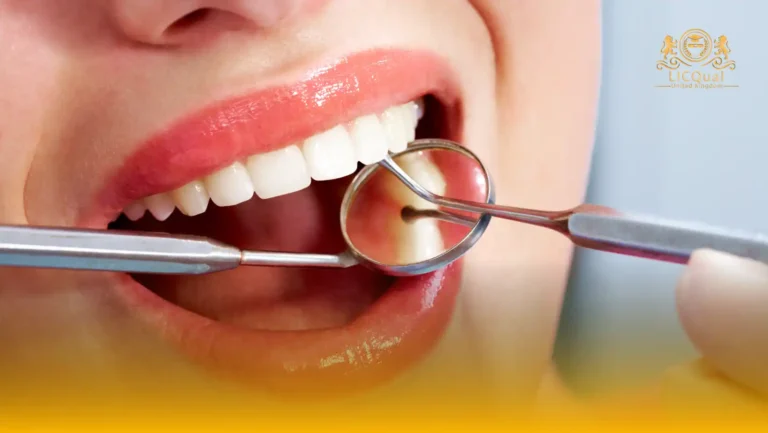The LICQual Level 3 Diploma in Temporomandibular Joint (TMJ) Disorders is a specialised qualification designed for dental professionals and healthcare practitioners who wish to expand their expertise in diagnosing, managing, and treating TMJ-related conditions. This programme is not intended for fresh candidates; rather, it is tailored for experienced learners who are seeking to strengthen their clinical knowledge, enhance their professional skills, and progress further in their careers.
The course provides in-depth knowledge of the anatomy and physiology of the temporomandibular joint, common disorders, advanced diagnostic methods, and evidence-based treatment approaches. Learners will also gain insights into patient-centred care, pain management techniques, and the integration of TMJ disorder management within broader dental and medical practices. By completing this diploma, professionals will be better equipped to deliver high-quality care, improve treatment outcomes, and increase their Continuing Professional Development (CPD).
Centres offering this qualification are required to meet the highest standards to ensure effective learner development. They must have competent and qualified staff, well-structured training methodologies, and access to the necessary clinical resources and study materials. This ensures that every learner receives a rich and supportive learning experience that prepares them for real-world application in clinical environments.
With its strong focus on professional growth and advanced clinical practice, the LICQual Level 3 Diploma in Temporomandibular Joint (TMJ) Disorders is an ideal pathway for healthcare and dental practitioners aiming to elevate their expertise, enhance patient care, and achieve greater career progression within the field of dentistry and oral health.
Course Overview
Qualification Title
LICQual Level 3 Diploma in Temporomandibular Joint (TMJ) Disorders
Total Units
6
Total Credits
60
GLH
240
Qualification #
LICQ2200669
Qualification Specification
To enroll in the LICQual Level 3 Diploma in Temporomandibular Joint (TMJ) Disorders, applicants must meet the following criteria:
|
Qualification# |
Unit Title |
Credits |
GLH |
|---|---|---|---|
|
LICQ2200669-1 |
Anatomy and Physiology of the Temporomandibular Joint (TMJ) |
10 |
40 |
|
LICQ2200669-2 |
Common TMJ Disorders and Pathologies |
10 |
40 |
|
LICQ2200669-3 |
Advanced Diagnostic Techniques |
10 |
40 |
|
LICQ2200669-4 |
Treatment Planning and Management Strategies |
10 |
40 |
|
LICQ2200669-5 |
Pain Management and Patient Care |
10 |
40 |
|
LICQ2200669-6 |
Professional Practice, Ethics, and CPD in TMJ Care |
10 |
40 |
By the end of this course, learners will be able to:
Unit 1: Anatomy and Physiology of the Temporomandibular Joint (TMJ)
- Explain the detailed anatomy and biomechanics of the TMJ.
- Identify the muscles, ligaments, and structures associated with TMJ function.
- Analyse normal TMJ movement and function to support clinical assessment.
Unit 2: Common TMJ Disorders and Pathologies
- Recognise the signs and symptoms of common TMJ disorders.
- Classify different types of TMJ pathologies, including myofascial pain, arthritis, and trauma-related conditions.
- Evaluate the aetiology and risk factors contributing to TMJ disorders.
Unit 3: Advanced Diagnostic Techniques
- Perform clinical assessment procedures for accurate TMJ diagnosis.
- Interpret imaging modalities, including X-rays, MRI, and CBCT.
- Apply evidence-based diagnostic strategies to distinguish between TMJ conditions.
Unit 4: Treatment Planning and Management Strategies
- Develop patient-centred treatment plans for TMJ disorders.
- Implement conservative and advanced management techniques, including occlusal appliances and physiotherapy.
- Assess the need for referral and interdisciplinary care in complex cases.
Unit 5: Pain Management and Patient Care
- Apply techniques for managing acute and chronic TMJ-related pain.
- Utilise non-invasive, pharmacological, and behavioural strategies to improve patient outcomes.
- Communicate effectively with patients to enhance treatment compliance and satisfaction.
Unit 6: Clinical Practice, Patient Safety, and Professional Development
- Assess and manage TMJ disorders in compliance with clinical safety and infection control standards.
- Demonstrate effective patient communication regarding diagnosis, treatment options, and potential risks.
- Apply reflective practice to improve clinical skills and patient care in TMJ disorder management.
- Commit to ongoing Continuing Professional Development (CPD) to maintain and enhance expertise in TMJ care.
The LICQual Level 3 Diploma in Temporomandibular Joint (TMJ) Disorders is designed for dentists, dental specialists, and oral healthcare professionals who want to gain advanced expertise in diagnosing and managing TMJ dysfunction and related orofacial conditions. This course is ideal for those seeking specialization in TMJ disorders, evidence-based patient care, and internationally recognized credentials. Whether you are a practicing dentist, a recent graduate, or a clinician aiming to expand into TMJ and orofacial pain management, this diploma equips you with the skills to deliver effective, patient-centered treatment.
1. Practicing Dentists Seeking TMJ Specialization
- Designed for licensed dentists aiming to expand their clinical services.
- Provides training in TMJ anatomy, dysfunction diagnosis, and treatment planning.
- Enhances skills in occlusion therapy and oral appliance management.
- Strengthens patient care strategies for jaw and facial pain.
- Offers internationally recognized credentials to boost professional credibility.
2. Dental Specialists
- Ideal for orthodontists, prosthodontists, and restorative dentists.
- Focuses on integrating TMJ diagnosis and therapy into specialized practice.
- Builds expertise in advanced clinical management of TMJ disorders.
- Enhances understanding of multidisciplinary approaches to jaw dysfunction.
- Prepares specialists to manage complex orofacial pain cases effectively.
3. Early-Career Dental Graduates
- Suitable for recent BDS, DDS, or equivalent graduates seeking TMJ specialization.
- Provides foundational knowledge in temporomandibular joint disorders.
- Prepares learners for advanced clinical and academic roles.
- Encourages evidence-based practice in patient assessment and management.
- Increases employability in private and hospital-based dental settings.
4. International Dental Professionals
- Tailored for practitioners seeking UK-accredited TMJ Disorders qualifications.
- Offers flexible online learning accessible worldwide.
- Aligns with international standards in TMJ diagnosis and therapy.
- Enhances global recognition and professional mobility.
- Provides practical guidance for modern clinical TMJ management techniques.
5. Dental Educators and Academic Professionals
- Designed for lecturers and trainers updating curriculum on TMJ and orofacial pain.
- Incorporates evidence-based treatment techniques for teaching and training.
- Supports academic leadership and research in dental and orofacial care.
- Enhances credibility as an expert in TMJ education.
- Provides opportunities for case studies and clinical research contributions.
6. Clinic Owners and Practice Managers
- Helps dental practice owners expand services into TMJ care.
- Provides strategies for managing patients with jaw dysfunction efficiently.
- Strengthens team supervision and treatment protocol management.
- Enhances patient satisfaction through specialized care.
- Promotes practice growth by offering advanced orofacial pain management services.
7. Career-Oriented Dental Professionals Seeking Recognition
- Ideal for professionals aiming for internationally recognized TMJ credentials.
- Enhances clinical expertise and professional credibility in managing jaw disorders.
- Opens pathways to advanced clinical, consultancy, or academic roles.
- Provides a career-boosting foundation in TMJ and orofacial pain management.
- Equips professionals to excel in multidisciplinary dental and medical environments.
To deliver the LICQual Level 3 Diploma in Temporomandibular Joint (TMJ) Disorders effectively and ensure high-quality learning outcomes, centres must meet the following requirements:
- Qualified and Competent Staff: Centres must employ experienced and certified dental or healthcare professionals with expertise in TMJ disorder management to deliver the curriculum effectively.
- Clinical Facilities and Resources: Adequate clinical facilities, including examination and treatment areas, diagnostic tools, and patient care equipment, must be available to support practical learning.
- Access to Learning Materials: Centres should provide learners with access to relevant study resources, including textbooks, research papers, and digital learning materials.
- Safety and Infection Control Standards: Centres must adhere to current clinical safety and infection control protocols to ensure a safe learning and treatment environment.
- Assessment and Evaluation Tools: Appropriate facilities and tools for practical assessments, examinations, and reflective practice must be in place.
- Support for CPD and Professional Development: Centres should facilitate ongoing learner development through Continuing Professional Development (CPD) guidance and opportunities.
- Learner Support Services: Centres must provide structured learner support, including mentoring, guidance on assessments, and access to clinical supervision.
Meeting these requirements ensures that learners receive a professional, safe, and comprehensive learning experience, equipping them with the skills and knowledge to excel in TMJ disorder management and advance their careers in dental and healthcare practice.
Assessment and Verification
All units within this qualification are subject to internal assessment by the approved centre and external verification by LICQual. The qualification follows a criterion-referenced assessment approach, ensuring that learners meet all specified learning outcomes.
To achieve a ‘Pass’ in any unit, learners must provide valid, sufficient, and authentic evidence demonstrating their attainment of all learning outcomes and compliance with the prescribed assessment criteria. The Assessor is responsible for evaluating the evidence and determining whether the learner has successfully met the required standards.
Assessors must maintain a clear and comprehensive audit trail, documenting the basis for their assessment decisions to ensure transparency, consistency, and compliance with quality assurance requirements.







